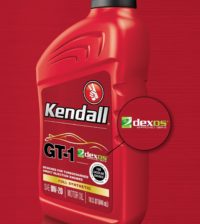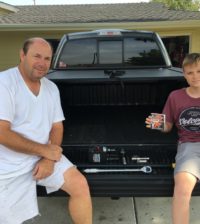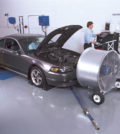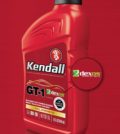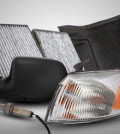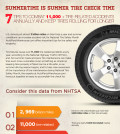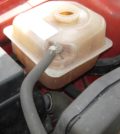- Summertime is Summer Tire Check Time: 7 Tips To Combat 11,000+ Tire-Related Accidents Annually — and Keep Tires Rolling for Longer
- 10 DIY Tips to Add Years to a Vehicle’s Life & Minimize Expensive Repairs
- Defensive Driving Tips to Avoid Costly Repairs As Wintery Driving Conditions Continue to Plague Roads
- AutoPartsWarehouse.com 2013 Child Passenger Safety Tips and Resource Guide
- Top Five Parts to Make Your Vehicle More Fuel Efficient
Kendall Motor Oil Knowledge Session-Things to know about Full Synthetic Motor Oil Additives
By AutoPartsWarehouse Staff, images courtesy of Kendall Motor Oil
There is much more going on in your motor oil than meets the eye and in this next Kendall Motor Oil Knowledge Session we will learn more about the additives that Kendall chooses to ensure Kendall Full Synthetic oils perform across the broadest range of engine conditions and driving requirements.
We spoke with Dr. Jonathan Vilardo, Director of Lubricants Research and Development at Kendall parent company Phillips 66. Jon has over 17 years of experience in various technical and commercial functions supporting additives for lubricants and fuels. Jon received his Ph.D. in organometallic chemistry from Purdue University in 1999 and B.S. in Chemistry from SUNY Geneseo in 1995.
Jon shared details on the chemistry and benefits of the various additives that Kendall includes in their GT-1 Full Synthetic motor oils. It turns out that as many as 8 to 12 different additives are blended into Kendall oil to combat the various forces and by-products present in an internal combustion engine. Besides the obvious factors like heat (thermal breakdown) and wear (metal on metal contact) Kendall chemists have to satisfy the stringent requirements of the American Petroleum Institute (API) to earn their API “donut” and ILSAC (International Lubricants Standardization and Approval Committee)“starburst” seals to indicate to consumers that Kendall oil meets highly stringent industry and OEM performance and testing standards.

In addition to fighting against the typical heat and wear issues, Kendall Full Synthetic oil is protecting all critical engine components like pistons, camshafts, turbochargers, bearings, valve train and seals from the negative effects of oxidation, corrosion and sludge build-up that can cause durability issues impede performance, fuel economy and impact engine life.
Jon shared that the buildup of acids and varnish as well as low speed pre-ignition are just a few of the unseen enemies of a healthy engine. Kendall chooses the best base oils, viscosity modifiers and additives to ensure that Kendall users receive the very best protection. This allows Kendall to deliver high performance regardless of engine type or environment. Considering that a Kendall customer on the East Coast will have to deal with winter temperatures into negatives and that a West Coast customer will see more frequent triple digits in the Summer, one can get a sense of the wide range of variables that Kendall full Synthetic has to deal with to keep an old or new engine operating within its design parameters.

We never thought of motor oil as “backward compatible” like software but Jon pointed out that Kendall has to formulate for the latest, fuel efficient and boosted engines popular today while being just as effective in lower tolerance, lower compression engines of the past. That’s a huge challenge, but Kendall achieves and exceeds this via testing, a tremendous amount of testing.
Jon walked us through the gauntlet that Kendall full Synthetic oil formulations must pass before they can earn the approval of the API. Passing performance in five different engine dynamometer tests ranging from 40 to 216 hours EACH are required to meet even the most basic industry for a “candidate” oil formulation. If just one individual test is failed then the candidate formulation has to be modified and testing starts all over again. It would be like running in a marathon and having to start over if you had to stop and tie your shoe or take a water break! The latest Kendall full Synthetic 0W-20, 5W-20, 5W-30, 5W-40 and 10W-30lubricants adhere to the ILSAC GF-5 and API SN standards which offers piston deposit, sludge and corrosion control, seal compatibility and fuel economy. Jon reminded us that the most important information that any car owner can access to determine the right oil formula for their vehicle can be found in their owner’s manual.
Finally, we asked Jon about Kendall Liquid Titanium® protection additive and its advantages in Kendall motor oil. Rather than marketing hype Jon told us that Liquid Titanium in Kendall formulations creates a molecular level film that adheres to parts offering extra protection and it reduces friction inside an engine. Another benefit of Liquid Titanium is realized with the increases in CAFE standards (Corporate Average Fuel Economy) adopted by US vehicle manufacturers; the trend has manufacturers specifying thinner oils like 0W-20 (and lower). With the ever increasing forced air and fuel injection pressures and higher temperatures and loads encountered by today’s modern engines it’s up to high quality lubricant manufacturers like Kendall to meet the needs of short commute- stop and go drivers, heavy haulers and extended interval oil changers and all of their unique motoring habits. While all of these behaviors are considered severe duty, the good news is that Kendall Full Synthetic motor oils are designed to keep your engine in good operating condition regardless of the type of driver you are.
If you would like to learn more about full synthetic oils please take a look at a recent study published on the subject by the AAA at: http://newsroom.aaa.com/2017/06/aaa-spills-truth-oil-changes/
To shop Kendall Motor Oil on AutoPartsWarehouse please visit: http://www.autopartswarehouse.com/search/?Ntt=Kendall&searchType=global&shopId=1&N=0&addfitment=1

